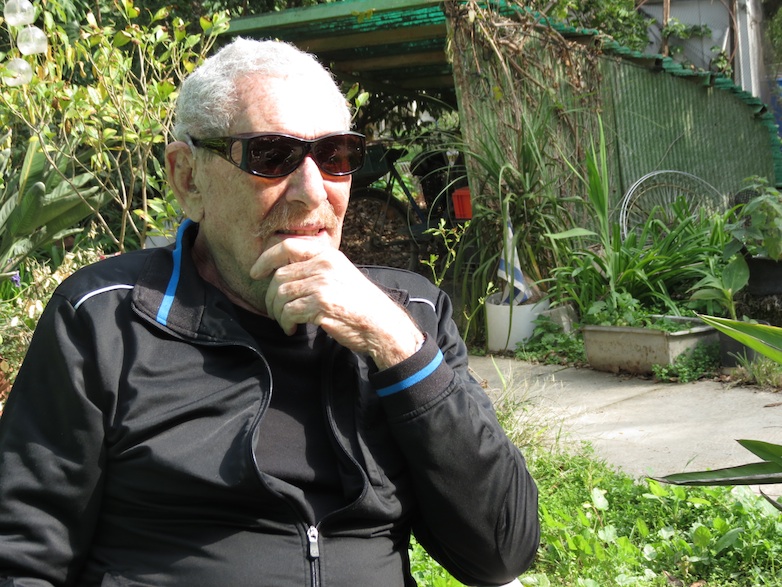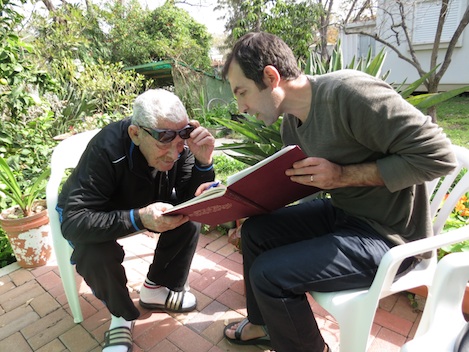
Testimony on Video
Testimony in Russian
_____________________
Zvingi: I joined the Hashomer Hatzair Youth Movement completely by accident. Every member of a certain age went to the Haganah, and then to the Palmach. We were educated of course to settle the country, to achieve self-realization. And we looked forward to the day when we could establish our own kibbutz. One day they came to us and said that… They were planning to settle in Gush Etzion.
We were thrilled – first of all, because this was a new settlement. Secondly, we were located within a densely populated Arab area in a charming landscape, beautiful, mountainous, snow every winter. What could be better? We were more than willing to settle there. There was a village nearby called Khirbet Zakariya. It was a small village – two extended families – who had been there for generations. And they gave us water, because we had none, and they had waterholes.
Ami: Did you fear them?
Zvingi: No! You have to understand, the relationships between us and the Arabs at the time were neighborly. As soon as the Jewish State was declared on November 29 [1947], and the Gush came under siege, the fled the village.
Ami: Why did they flee?
Zvingi: Why did they leave?
Ami: Yes.
Zvingi: For one very simple reason, which is that this was the first time the Gush had to deal with such casualties, ten dead settlers, they were afraid of our revenge. That they would be killed if they didn't get out of there. They had this fear of vengeance. And it was completely natural for them to leave the place.
Raneen: How did you capture it?
Zvingi: We didn't capture it, they left!
Ami: They left and what happened next?
Zvingi: The next day we got in, and used the village as a stronghold in the defense of the Gush.
Ami: What do you mean, but this is somebody's house?
Zvingi: And if it is, so what? Does that mean we can't? If it was abandoned, did anybody even think to leave it like that?
Ami: Did anybody think about it?
Zvingi: No
Ami: Nobody thought about it?
Zvingi: It was taken for granted… We would not have fought them, but as soon as they… We found the place empty, and we could use it as a stronghold in case of an attack on the two settlements of Ein Zurim and Revadim – it was only natural for us to come and take it and defend ourselves. Yigal Allon came to visit us after the Nebi Daniel convoy, part of which managed to return to the Gush and part of which fell to the Arabs [in March 27, 1948]. He flew in a light plane. Naturally, because he was the head of the Palmach, we held a general assembly, and he told us about the ideology. Why we had to settle… Gush Etzion – because this could be a stepping stone to the Negev, and we had to defend it.
Ami: Do you think he had a transfer ideology?
Zvingi: Yigal? Look, I don't know for certain, I can't say that Yigal Allon fought for transfer. But in practice, as a commander, he did it. In Lydd and Ramle, for example, they expelled them from there! They did not run away. From there, they were expelled. I will tell you a story. We met in Fallujah – I drove the jeep, Ben Gurion sat next to me, and Moshe Dayan was behind me. We arrived at Al-Dawayima, I don't know if you know where it is…
Ami: I know where it is.
Zvingi: It's… right on the border.
Ami: Right on the [19]67 border.
Zvingi: 67. And there was a mosque there. The village was destroyed in the war, but the mosque remained with the minaret and the crescent on top. And I was lecturing to Ben Gurion about the Gush [Yoav], but what does Moshe Dayan care about all that? He walks around. And later he also asked to go on a little hike, and they picked some fruits for him – it was the season. So he comes up to me and says, look, you see that crescent up there? I said yes. Tomorrow, make sure it's in my office.
Now what can you do? Can you tell him, sir, I do not destroy mosques? I walked around, looked for a way of doing it, to reach the top of that minaret, that crescent. There was nothing to it but to blow it up. I had a bomb squad brought in at night, we blew it up, and now it all fell, it was all in pieces… We couldn't find that crescent. So we brought in another unit to help us clear all the stones. In the morning they found it – bent, crooked. I took it, I had my orders – tomorrow morning get me that crescent – and I took it to Revadim, the chief mechanic was a friend of mine – he's no longer with us. And I told him, Gedaliah, can you make something out of this, straighten the thing up here and there, he took it and returned it in mint condition. I drove to the IDF HQ, entered his office, he says, thank you, you can leave it here – goodbye!
Raneen: Have you heard of any cases of rape during the war?
Zvingi: During the actual war, no. I do know of one case, where the Palmach castrated the Arab. He raped a female Palmach member in the Beit She'an Valley before the Palmach became part of the IDF, and the Palmach found him and castrated him.
Raneen: The [Jewish] settlements in this area are located on Palestinian village lands. What do you think about that? In terms of the solution for the refugee problem. Do you think people should have their property returned to them?
Zvingi: No! You can settle it financially – compensate them – but today we are sitting inside the borders of a state, we are an independent state, and I'm against the return of the refugees.
_______________________________

צבי סטקלוב, חייל בפלמ"ח / Zvi Steklov, Palmach soldier

